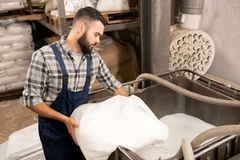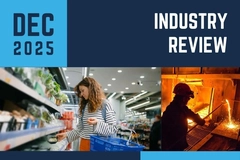UK consultancy calls for e-commerce packaging LCAs amid “plastic demonization”
Plastic-based e-commerce packaging could benefit from full life-cycle assessments (LCAs) rather than tighter packaging regulation, according to Zoe Brimelow, director at Duo UK, a packaging manufacturer and waste management consultancy based in Manchester, UK.
In a discussion with Packaging Insights, Brimelow indicates that rather than “demonizing” plastic bags, a full LCA of e-commerce operations can help businesses make informed supply chain decisions by considering every stage of the packaging process, including costs and performance.
Research from paper packaging company DS Smith highlighted that online fashion retailers delivered 941 million plastic bags to UK shoppers in 2024, indicating that almost 7 billion plastic bags will be used for UK deliveries by 2030.
The surge in online fashion retail is reversing years of progress in reducing plastic packaging, highlighting a growing divide between e-commerce shopping and retail efforts to curb waste.
However, Brimelow suggests understanding the end-to-end processes of e-commerce packaging through LCAs rather than dismissing plastic as unsustainable.
 Brimelow suggests that accelerating the collection of post-consumer e-commerce plastic bags would enhance the UK's recycling rates.What current trends are there in plastic-based e-commerce packaging?
Brimelow suggests that accelerating the collection of post-consumer e-commerce plastic bags would enhance the UK's recycling rates.What current trends are there in plastic-based e-commerce packaging?
Brimelow: E-commerce in the UK is booming, with data showing record online sales last year. The value of e-commerce sales topped £127 billion (US$169 billion) in 2024, representing a year-on-year growth of 3.4%.
Customers value the flexibility and convenience of online shopping, a trend that’s likely to grow further as payment and return options evolve, making ordering online even more shopper-friendly.
Growth in e-commerce orders and packaging volumes will likely increase the spotlight on supply chain efficiencies, especially as the UK strives toward a circular economy. The challenge — and opportunity — for packaging manufacturers, retailers, and consumer brands is to look at full packaging LCAs. This assessment can help boost packaging sustainability and deliver carbon savings throughout e-commerce supply chains.
What challenges face the production and use of plastic e-commerce bags?
Brimelow: One challenge is the impact of the UK’s Plastic Packaging Tax. We’ve seen the levy drive increased demand for e-commerce mailing bags made from at least 30% recycled plastic content.
On the surface, this seems a huge positive for recycling and circularity. The issue is that the UK seriously lacks closed-loop recycling infrastructure, making it difficult to source consistently high-quality recycled plastic pellets.
Another challenge for plastic e-commerce bags is the general demonization of plastic. There’s a lot of widespread negativity about the material, which can mean its sustainable performance is overlooked and completely missed.
Some study findings are likely to surprise most people because plastic is often written off so quickly in favour of materials that are perceived to be more sustainable.
Can current recycling methods deal with plastic e-commerce waste production?
 Plastics are often written off in favor of less sustainable materials, says Brimelow.Brimelow: The technology and processes exist to recycle post-consumer e-commerce plastic bags. Wash plants and recycling equipment can effectively deal with paper labels on bags to avoid contaminating the recycled plastic content.
Plastics are often written off in favor of less sustainable materials, says Brimelow.Brimelow: The technology and processes exist to recycle post-consumer e-commerce plastic bags. Wash plants and recycling equipment can effectively deal with paper labels on bags to avoid contaminating the recycled plastic content.
Increasing the collection of post-consumer e-commerce plastic bags and making it easier for consumers and businesses to recycle them would enhance recycling rates.
Is a levy on plastic bags a suitable strategy to manage e-commerce waste?
Brimelow: I’m unsure whether another levy on e-commerce plastic packaging would be realistic or effective. Consideration must be given to who absorbs the costs of additional levies, whether businesses or consumers, and how these added costs ripple through supply chains.
Instead of hitting businesses and consumers with a levy, it could be more beneficial to focus on encouraging the full LCAs of packaging. An end-to-end understanding of what’s required from packaging performance throughout a supply chain can help avoid any material bias to find the right packaging solution, for the right application, to support sustainability.
How can LCAs help businesses choose the right material for e-commerce packaging?
Brimelow: Full LCAs consider every stage of packaging and all the different variables that will impact costs, operations, performance, and sustainability. It’s a process that allows businesses to make informed decisions and create packaging strategies that deliver widespread value.
We worked closely with Charles Tyrwhitt on this process. After careful consideration and research, the menswear brand switched from cardboard to plastic packaging for its deliveries.
What alternative solutions are available for plastic e-commerce bags?
Brimelow: There are many different packaging material options available, from paper, through to cardboard and bioplastics, such as GreenPE — a recyclable mailing bag made from ethically grown sources of sugar cane.
 Duo UK offers packaging solutions based on LCA data to support innovation.The most important thing is to find the best-fit solution that meets the requirements of the packaging application and supply chain challenges. Consumers want their e-commerce orders to arrive in perfect condition and will reject anything that does not meet their expectations. This can lead to items being sent back and associated supply chain mileage and carbon emissions incurred through processing returns.
Duo UK offers packaging solutions based on LCA data to support innovation.The most important thing is to find the best-fit solution that meets the requirements of the packaging application and supply chain challenges. Consumers want their e-commerce orders to arrive in perfect condition and will reject anything that does not meet their expectations. This can lead to items being sent back and associated supply chain mileage and carbon emissions incurred through processing returns.
Retailers have to think about how packaging can help to avoid returns caused by inadequate packaging, while maximising the reusability of packaging, so the same solution can be used to send items back, to help reduce material usage.
How does Duo UK support retailers in transitioning to more sustainable packaging?
Brimelow: We are proactive in specifying solutions based on the insights of a full packaging LCA and utilize data from the analysis to support innovation.
We were the first UK manufacturer to produce mailing bags from Braskem’s GreenPE. We pioneered the development of a collation shrink film for beverage packaging made from Oceanix HDPE. The material utilizes a high-quality recycled content collected from marine waste.
Duo also offers a closed-loop recycling service, where we collect and recycle used packaging in the UK. This helps retailers keep waste material in the loop and contribute to a circular economy for plastics.











